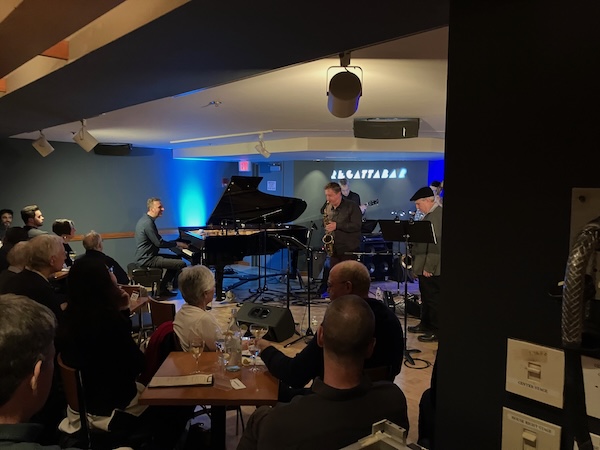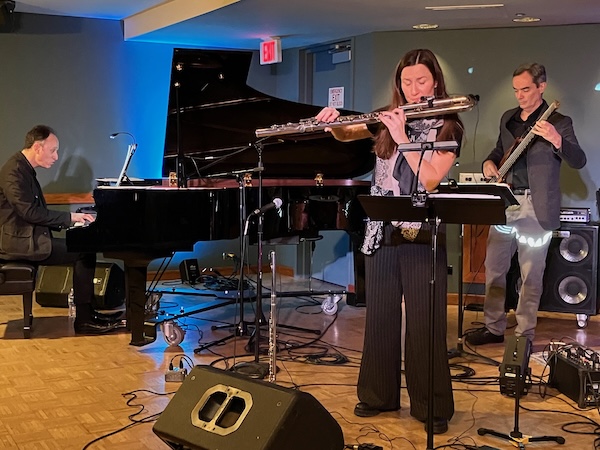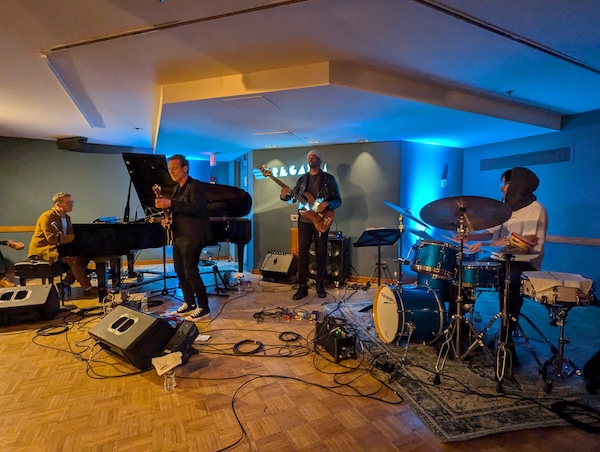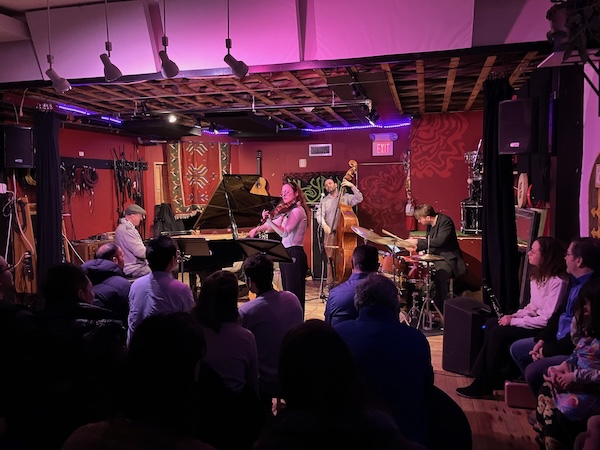Concert Reviews: Jazz Journal — An Overview of Recent Live Shows
By Jon Garelick
A Boston jazz critic’s notebook — three shows at Regattabar and one at the Lilypad.
January 30

Elan Mehler Sextet at the Regattabar. From left: Mehler, with Loren Stillman and George Garzone on saxophones. Photo: Jon Garelick
Sometimes pacing is everything. The pianist, composer, and record company impresario Elan Mehler fronted an impressive sextet at the Regattabar: alto saxophonist Loren Stillman, tenor sax, and Boston hero George Garzone, guitarist Ben Monder, bassist Tony Scherr, and drummer Francisco Mela (Garzone’s bandmate in the Fringe). As you’d expect, the playing was tight and often eloquent. Every tune had a shapely melodic-harmonic content, which the players adhered to faithfully. More often than not, after a piano introduction, Stillman would take the lead melody line, Garzone eventually harmonizing. The contrapuntal weave of their horns was one of the ongoing pleasures of the evening. But the program’s eight tunes, all Mehler originals, were mostly in ballad tempo, rarely coming to more than a slow simmer.
There was distinctive musical nourishment in every piece. “The Violence” (in ballad tempo despite the title) could almost have been a paraphrase of Mingus’s “Goodbye, Pork Pie Hat.” Stillman soloed with carefully deliberated melodic development, and Garzone played some softly laughing descending figures before reaching an altissimo climax. One unidentified tune in 3/4 had a wistful sense of minor-key nostalgia, with the melody dividing into question-and-answer phrases.
But the show began with one ballad-tempo tune and continued with another and then another. Monder, who can be incendiary, was here favoring a reverby, watery tone, and the R-bar sound mix wasn’t helping him, though he did get off one solo that accelerated from smolder to flame. Mela was an instigator throughout, occasionally egging on his pal Garzone.
It wasn’t until the final piece, “Shmoon” (Mehler’s own Yiddishism for a kind of reverse irony), that the band seemed to lift off, beginning with an extended solo from Scherr, digging into phrases that introduced an old-fashioned riff tune, including a heated exchange of choruses between Stillman and Garzone, a delirious snare clinic from Mela (with a well-placed bass-drum bomb here and there). And Mehler’s solo, too, generated some hard-bop frisson. In his more exuberant moments, Garzone showed his talent for issuing rude noises with refined control. It was a break from the evening’s overall reticence (the early tunes in the set all clocked in at around five minutes).
Mehler has several of his own albums on his vinyl-only Newvelle Records. (The label also includes a slew of entries from a broad range of talent, including Jack DeJohnette, Noah Preminger, Ellis Marsalis, and Irma Thomas.) If There Are Mountains, from 2019, with Dave Douglas and Dominique Eade, is particularly tasty. And so is his solo-piano disc from last year on Sunnyside, Trouble in Mind. I’d be happy to see Mehler anytime, especially given his choice of collaborators. I’d be even happier to hear him break things up with a couple of fast grooves.
January 31

Yulia Musayelyan (on bass flute) at the Regattabar with pianist Maxim Lubarsky and bassist Fernando Huergo. Photo: Jon Garelick
The “meaning” of instrumental music is sometimes revealed in titles, and sometimes it’s right there in the music itself, in the most basic way. At least, that’s what’s suggested by the title track of flutist and composer Yulia Musayelyan’s latest release, Strange Times (Wherego Music). The tune’s mixed meters neatly reflect Musayelyan’s attempts to come to grips with, as she says in the album notes, “these deeply unsettling times.”
At the Regattabar, Musayelyan talked about the album’s genesis during the first days of Covid — it was recorded in April of last year — but the title track seems to have had a carryover effect since the November 5 election. Judging by the night’s music, Musayelyan’s coping mechanism involved introspection and a search for balance, reflected in the juggling of odd meters, and the kind of melodic lyricism that poses darkness against light.
The Moscow-born Musayelyan is a valued flute soloist on the Boston scene (as well as assistant chair in Berklee’s ear training department), and is especially keyed into varied Pan-American forms. So is the band: Musayelyan’s partner, bassist Fernando Huergo, pianist Maxim Lubarsky, and drummer Mark Walker all appear regularly with various Latin jazz outfits. (Huergo’s big band album, Relentless, featuring Musayelyan, was a standout in 2024.)
Strange Times developed as Musayelyan and the Argentina-born Huergo worked on duets, including Argentine folk songs, and at the show you could hear Argentine and various South American strains throughout — even in “Fevral,’” by the Russian folk duo IVASI, which Musayelyan arranged like a Venezuelan joropo.
This versatility — despite the overall reflective cast of the program — kept everything kinetic and fresh, even in the meditative opener, “Rothko Sketches,” with its overlapping passages reflecting that artist’s work, not to mention double-time departures by Walker and the twisty runs in Musayelyan’s solo. There were nuanced details to savor in each piece, like the lickety-split unison of bass flute and electric bass in Huergo’s “Solstice,” or the propulsive riffing on the uptempo “Futurism,” its rhythms based on Uruguayan candombe, or the go-for-broke 6/8 groove of “Fevral.’” Musayelyan’s melodic gift was everywhere apparent, especially in ballad-tempo pieces like that deceptively tricky album title song or the lovely nocturne “Perugia at Night.”
“Fevral” was from Musayelyan’s previous album, Unsaid (2020), which included adaptations of other Russian, Ukrainian, and Armenian folk melodies. It would be interesting in future shows to see how she incorporates all of these influences. In any case, more solace for strange times.
February 7

Aaron Parks’s Little Big quartet, with (from left) Parks, Greg Touhey, David Ginyard Jr., and Jongkuk Kim. Photo: David Hammond
These days, it seems the vamp is the thing. Those short phrases, the toggling of one or two chords that establish a groove, seem to be undergirding a lot of popular jazz right now — that, rather than complex harmonies and mixed meters. Recent shows by Immanuel Wilkins, Marquis Hill, Joel Ross, even Kris Davis, and now pianist Aaron Parks’s Little Big quartet, have all been vamp-inclined.
Little Big’s music is deceptively simple, with appealing major key melodies that sometimes border on the saccharine. But never quite. And those vamps, those grooves! Never overplaying, always leaving plenty of space, savoring small shifts in the music, the band — playing the first of two sold-out shows at the Regattabar — made every piece irresistible. And when the full groove took hold, it was like getting sucked into a pleasurable gravitational pull.
They began with the fast left-hand piano tattoo of “Rising Mind” (from the band’s first, self-titled album, in 2018) and then snare-drum patter and soft bass-drum bombs as Parks spelled out the theme and unfurled longer and longer lines — always “rising” — in his right hand over the weave of drums, electric bass, and then guitar. The ingredients were spare, but the tension of that sustained piano tattoo propelled the piece.
The contours of the music were often familiar. (Most of the songs were from the band’s latest album, Little Big III, on Blue Note.) Guitarist Greg Touhey’s Caribbean-accented “Sports” (with bassist David Ginyard Jr. setting the vamp) could have been a variation on Weather Report’s “Birdland.” “Delusions” leaned toward Afropop. The soft chords of “Here” suggested the Beatles’ “Golden Slumbers”/ “Carry That Weight.” After a rubato piano intro, “Kid” turned into unabashed rock. And Parks’s solo piano encore, “Lilac,” seemed to be a folk-pop song crying out for words.
But the pleasurable familiarity was also accompanied by surprising details, deft shifts in mood and tempo. The nine-beat pattern of “The Ongoing Pulse of Isness” kept landing on unexpected cadences. The slow eight-note melody of “The Machines Say No” repeated as a kind of passacaglia to the increasingly frantic rave-up of Jongkuk Kim’s drums, with Ginyard phrasing slightly behind the beat. Even the rock of “Kid” rode on syncopations that avoided heavy-footed backbeats.
I’m a bit late to the party, but is this the new face of jazz-rock fusion, via Pat Metheny (prog) and Weather Report with a dollop of early Keith Jarrett (those “island” and “world music” tunes)? If so, it’s a warming, appealing place to be.
February 20, 2025

Ehud Ettun’s Internal Compass Collective at the Lilypad, with (from left) pianist Tim Ray, violinist Angela Varo-Moreno, Ettun, and drummer Adam Zagórski. Photo: Jon Garelick
If there was a through-line at the performance by bassist/composer Ehud Ettun’s Internal Compass Collective at the Lilypad on February 20, it was melody. Which may sound odd, but tunes are not necessarily what jazz improvisers are thinking about — maybe it’s chords, rhythmic patterns, or “areas” of sound, as avant-garde trio the Fringe used to call it. Melody, not so much.
But Ettun established the band’s agenda in the first piece, his “Deep in the Mountains,” singing a wordless minor-key folk tune in unison with his plucked bass before slamming hard into a vigorous ostinato and bringing in violinist Angela Varo-Moreno, pianist Tim Ray, and drummer Adam Zagórski. The tune had a very dance-like feel, though the meter (6/8?) would have been strange for dancing. But that rolling, dance-like movement was sustained, even through some drum-break crescendos. And Ray and Varo-Moreno shaped their solos, no matter how far-flung, to the contours of that original melody. Ettun’s melodic-rhythmic lines of accompaniment were also key, and it was especially cheering to hear him fall into unison with Ray’s solo on a turn of the chorus. In an email exchange after the show, Ettun told me the piece was based on a Korean rhythm of 36 beats in mixed meters. Not your grandaddy’s fox trot.
Those odd dance-like rhythms would be another connective theme. The second tune was based, Ettun said, on a Bulgarian folk dance, “Krivo Sadovsko Horo.” To these ears, it had a distinctive minor-key klezmer feel (hey, hora, right?), again very uptempo. Ettun later told me it was in 13/8. But Zagórski had the sensitivity to lay back on his kit during Ray’s solo, driving the beat hard but not muscling it. Ettun’s solo went into guitar-picking upper register and then the band came together for a double-time outro. Dancers: Don’t try this at home.
The band was joined by clarinetist Rinat Fishman, the clarinet and violin voicing especially effective on Ettun’s “Transparency.” After a few pieces, Ettun said he wanted to do a jazz number, in deference to Varo-Moreno, who is auditioning for jazz master’s programs. Joined by guitarist Mitch Livstone, the band launched into Jimmy Van Heusen and Johnny Burke’s “It Could Happen to You.” It was funny: Up until then, it had not occurred to me that the band wasn’t playing jazz.
But then, what was Bill Frisell’s “Strange Meeting,” which the band also played? Frisell, though clearly jazz, is also clearly something else. Here Livstone really shined, mixing up single-note lines and chording in another path through melody via harmony. Ettun capped off his own athletic solo with some guitar-like strumming.
The Jerusalem-born Ettun received his master’s degree from New England Conservatory in 2012 and has since returned to Israel, to play and to pursue an abiding interest in education, founding the Internal Compass Music college.
For the time being, he’s in the US, with a busy performance schedule (he played Mandorla Music’s Dot Jazz Series back in December) as well as teaching, including at NEC and online at Internal Compass, with occasional return trips to Israel. At the Lilypad, his wife and two young children (one an infant) were in the audience. Here’s hoping he won’t be a stranger.
Jon Garelick can be reached at garelickjon@gmail.com.
